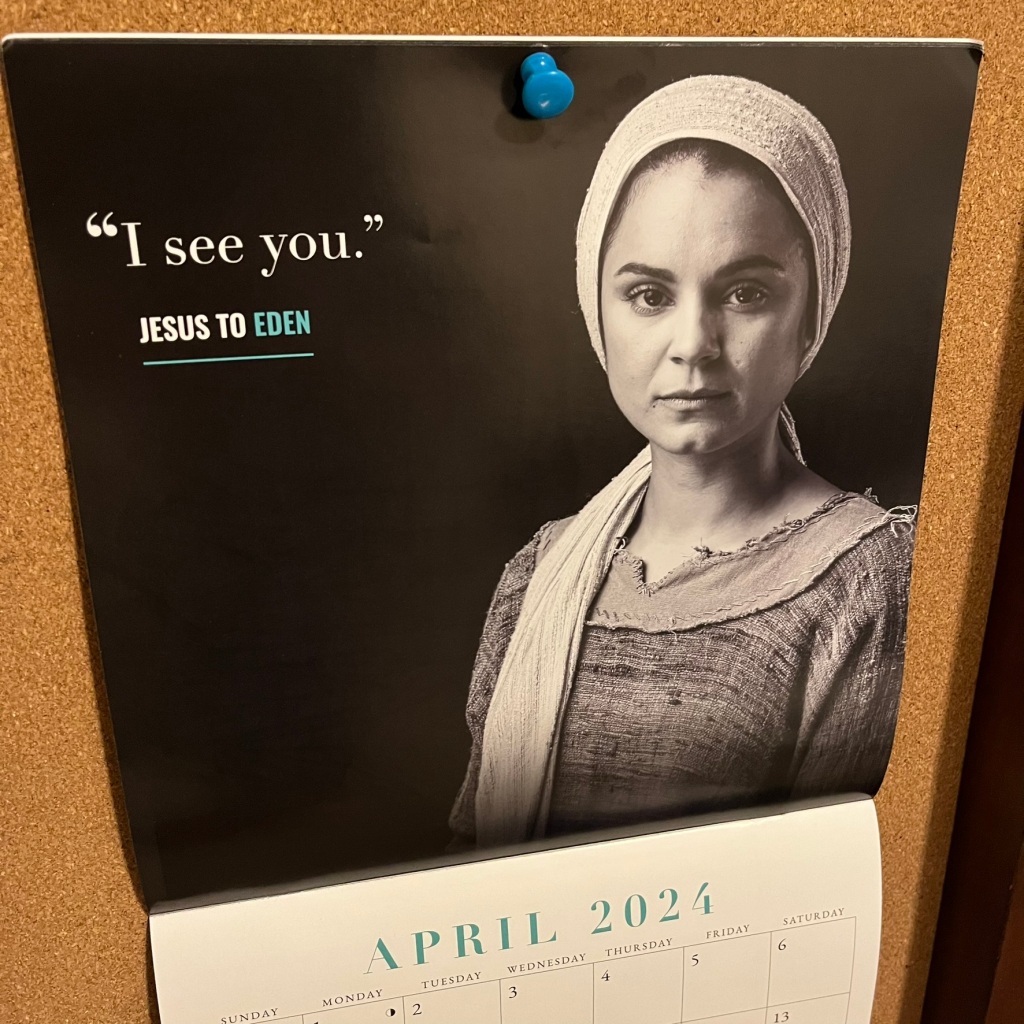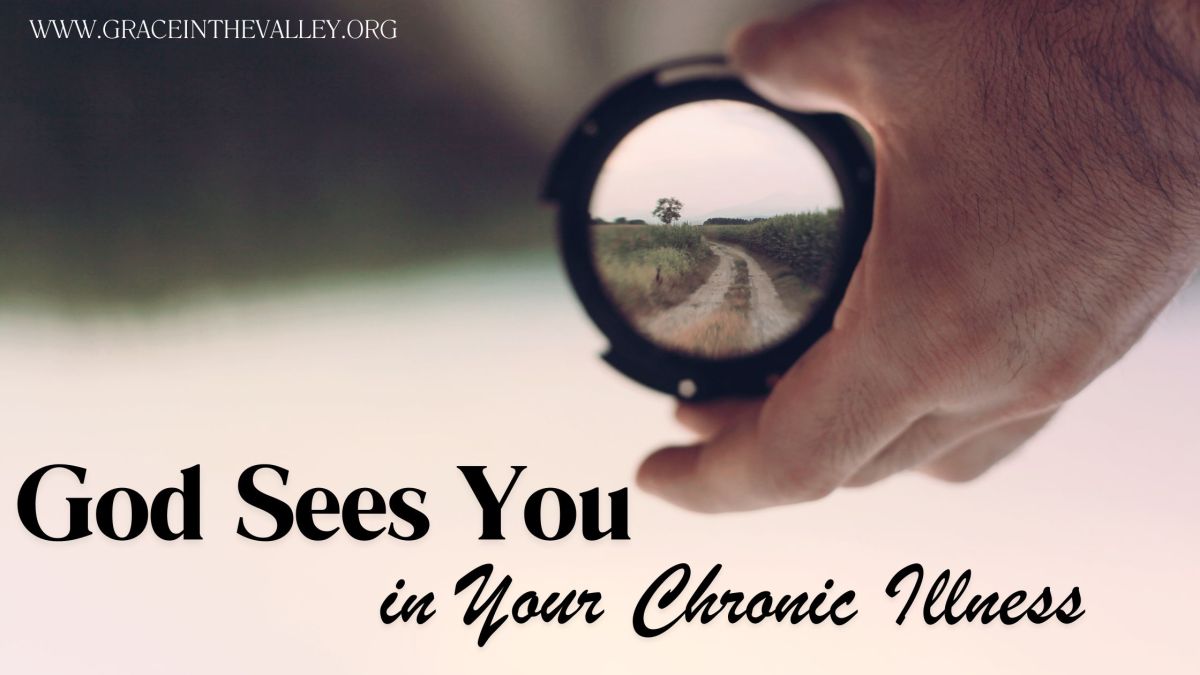We know God knows about our hardships. The Bible clearly and often states that God is omniscient: all-knowing.
Yet think about the difference between “see” and “know.” For example, if my friend on the East Coast is dealing with an injury, I can know about it if she tells me about it on the phone. (I live in Colorado.) But if I see her injury, it means I’m with her in person. I’m present. I’m there with her to physically see what she’s going through.
In the same way, God doesn’t just know about our struggles in the valley of chronic illness; He sees our struggles, our valleys, our hearts, which means He’s present with us in the valley. Psalm 23:4 says, “Yea, though I walk through the valley of the shadow of death, I will fear no evil; for You are with me” (emphasis added).
In March I started reading through the Bible again. As I absorbed the familiar stories in Genesis and Exodus, I was struck by a powerful theme that appeared in several key accounts: God sees the affliction of His people.
God Saw Hagar in Her Pain
The first account comes from Genesis 16. When Sarai’s Egyptian maidservant, Hagar, became pregnant by Abram (Sarai’s own idea, mind you), the relationship between the two women soured. Sarai “dealt harshly with” Hagar (16:6), and Hagar fled into the wilderness to protect her life and that of her unborn child.
It was in the wilderness that God came to Hagar. He told this mistreated, frightened foreigner woman to return to Sarai, and gave a blessing upon the son she would bear. Hagar’s response has become one of the hallmark passages of God’s identity from the Old Testament:
Then she called the name of the LORD who spoke to her, You-Are-the-God-Who-Sees; for she said, “Have I also here seen Him who sees me?” Therefore the well was called Beer Lahai Roi.
Genesis 16:13-14
John MacArthur notes that this title given to God refers to “the omniscient eye that followed her and sought her out even when she tried to hide.”11
I’m reminded of Psalm 139:7-12:
Where can I go from Your Spirit?
Or where can I flee from Your presence?
If I ascend into heaven, You are there;
If I make my bed in hell, behold, You are there.
If I take the wings of the morning,
And dwell in the uttermost parts of the sea,
Even there Your hand shall lead me,
And Your right hand shall hold me.
If I say, “Surely the darkness shall fall on me,”
Even the night shall be light about me;
Indeed, the darkness shall not hide from You,
But the night shines as the day;
The darkness and the light are both alike to You.

God Saw Leah in Her Loneliness
The next account takes place two generations later, in the life of Jacob’s wife Leah (his first of four). Jacob wanted to marry Leah’s younger sister, Rachel, and worked seven years for her hand. Jacob’s future father-in-law, however, duped Jacob and substituted Leah for her sister during the wedding ceremony. Jacob still got Rachel afterward, but now he had two wives: the woman he really wanted AND her (likely) less attractive sister.
As Michelle Kelso Kaifer writes, Leah was “merely a commodity for her father’s selfish gain and a requisite to her husband.”2
Look at what the Bible tells us in Genesis 29:31-32:
When the LORD saw that Leah was unloved, He opened her womb; but Rachel was barren. So Leah conceived and bore a son, and she called his name Reuben; for she said, “The LORD has surely looked on my affliction. Now therefore, my husband will love me.”
Leah felt unseen by the very people who should have treasured her most. Yet God saw her, and He reminded her of His kind, near presence when He gave her a child that would grant her favor in her family.
This idea of seeing shows up in Reuben’s name as well; literally translated, it means, See, a son. By naming her son Reuben, Leah beckoned for everyone else to see how God had seen her.
Michelle Kelso Kaifer goes on to write,
God did not force Jacob to stop hating Leah, but He was there to love her and minister to her in the midst of her hostile environment. God . . . will not remove us from the hostile environment of this sin-cursed world … yet. However, we can rest assured that, as He did with Leah, He sees, He hears, and He reveals His love and meets our innermost needs on a personal basis.3
This same idea appears in another of the Psalms:
When my spirit was overwhelmed within me,
Psalm 142:3-7
Then You knew my path.
In the way in which I walk
They have secretly set a snare for me.
Look on my right hand and see,
For there is no one who acknowledges me;
Refuge has failed me;
No one cares for my soul.
I cried out to You, O LORD:
I said, “You are my refuge,
My portion in the land of the living.
Bring my soul out of prison,
That I may praise Your name;
The righteous shall surround me,
For You shall deal bountifully with me.”

God Saw Jacob in His Struggle
The next account takes place in the life of Jacob himself. Four wives and eleven sons later, Jacob was ready to leave his father-in-law in Padan Aram and make his own way to the land God had promised him in Canaan.
The problem was, Laban hadn’t treated Jacob fairly.
Jacob lays out his grievances to Laban in Genesis 31:38-41:
These twenty years I have been with you; your ewes and your female goats have not miscarried their young, and I have not eaten the rams of your flock. That which was torn by beasts I did not bring to you; I bore the loss of it. You required it from my hand, whether stolen by day or stolen by night. There I was! In the day the drought consumed me, and the frost by night, and my sleep departed from my eyes. Thus I have been in your house twenty years; I served you fourteen years for your two daughters, and six years for your flock, and you have changed my wages ten times.
Yet notice how he concludes:
Unless the God of my father, the God of Abraham and the Fear of Isaac, had been with me, surely now you would have sent me away empty-handed. God has seen my affliction and the labor of my hands, and rebuked you last night.”
Genesis 31:42
These ending words echo what God Himself told Jacob in a dream before their departure, promising His blessing on Jacob’s flock and adding the personal encouragement, “for I have seen all that Laban is doing to you” (31:12).
God saw how Laban’s inconsistency and outright deception was hurting Jacob, and He promised to deliver and bless Jacob.
Psalm 10:14 echoes this beautiful, tender part of God’s character:
But You have seen, for You observe trouble and grief,
To repay it by Your hand.
The helpless commits himself to You;
You are the helper of the fatherless.

God Saw the Israelites in Their Slavery
The next account took place nearly 400 years later, in the book of Exodus. Jacob and all his family moved to Egypt during a time of famine, where they stayed as their families multiplied. Eventually the Egyptians came to fear this growing people called the Hebrews, and began to oppress them with slavery.
The people were forced into labor, and Pharaoh went so far as to order all the male children born to the Hebrews to be killed. It was from this place of exhaustion, pain, loss, and hopelessness that “the children of Israel groaned because of the bondage, and they cried out; and their cry came up to God because of the bondage” (Ex. 2:23).
Look at what the next verses say: “So God heard their groaning, and God remembered His covenant with Abraham, with Isaac, and with Jacob. And God looked upon the children of Israel, and God acknowledged them.” (Ex 2:24-25).
This isn’t to say God had His head buried in the sand for the past four hundred years; it simply indicates an intentional and perfectly timed response to the grief of His people.

God communicated this same idea to Moses in the next chapter:
And the LORD said: “I have surely seen the oppression of My people who are in Egypt, and have heard their cry because of their taskmasters, for I know their sorrows.”
Exodus 3:7
And in the chapter following, the narrator highlights this idea one more time:
So the people believed; and when they heard that the LORD had visited the children of Israel and that He had looked on their affliction, then they bowed their heads and worshiped.
Exodus 4:31
I appreciate what Charles R. Swindoll wrote in his biography of Moses about this time in Israel’s history:
Do you ever imagine that your hard, harsh moments and tests escape God’s notice? You may become so discouraged, so filled with acute pain, that you begin to think God couldn’t be aware of your circumstances, or, if He is aware, then He doesn’t care. That’s a lie from the evil one himself.
God is always aware. And He cares very deeply. As we will see, He will do whatever it takes to rescue His people. It may be by calling you home to Himself, or it may be by splitting an ocean right down the middle so you can walk through on dry ground. His deliverance may not arrive on your timetable or in the manner you expect it, but it will arrive at the best time, the right time. He will not abandon His own.4
Psalm 102 captures this truth beautifully:
For He looked down from the height of His sanctuary;
Psalm 102:19-20
From heaven the LORD viewed the earth,
To hear the groaning of the prisoner,
To release those appointed to death.

God Sees You in Your Chronic Illness
The next story is yours. Your life. Your chronic illness. Right now.
Maybe you feel unwanted and belittled like Hagar. Maybe you feel invisible and unvalued like Leah. Maybe you’ve been treated unfairly like Jacob. Maybe you’re in a season of extreme hardship like the Israelites.
Wherever you are in your chronic illness, God sees. And He doesn’t just see your situation; He sees YOU.
For He has not despised nor abhorred the affliction of the afflicted;
Psalm 22:24
Nor has He hidden His face from Him;
But when He cried to Him, He heard.
Behold, the eye of the LORD is on those who fear Him,
Psalm 33:18
On those who hope in His mercy,
The eyes of the LORD are on the righteous,
Psalm 34:14
And His ears are open to their cry.
They also opened their mouth wide against me,
Psalm 35:22
And said, “Aha, aha!
Our eyes have seen it.”
This You have seen, O LORD . . .
But You, O Lord, know me;
Jeremiah 12:3
You have seen me,
And You have tested my heart toward You.
O LORD, You have seen how I am wronged;
Lamentations 3:59-60
Judge my case.
You have seen all their vengeance,
All their schemes against me.
“Return and tell Hezekiah the leader of My people, ‘Thus says the LORD, the God of David your father: “I have heard your prayer, I have seen your tears . . .'”
2 Kings 20:5
It was no coincidence that when I was first mulling over the ideas for this post, I turned the page of my Chosen calendar to find yet another reminder that God sees me in my chronic illness:

May we rest in the sweet promise wrapped in the words of the hymnist:
His eye is on the sparrow,
Civilla D. Martin
And I know he watches me.
Do you believe God sees you in your chronic illness? What does this say about God? What does this say about you? How can you rest in God’s character as The-God-Who-Sees?
